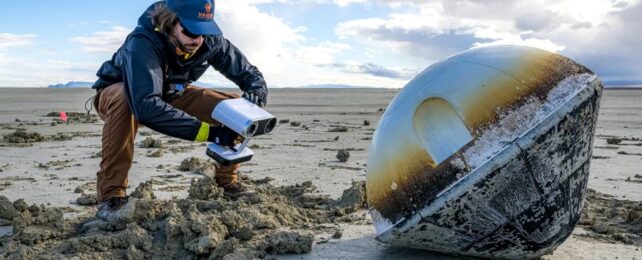On Wednesday, February 21st, at 01:40 p.m. PST (04:40 p.m. EST), an interesting package returned to Earth from space.
This was the capsule from the W-1 mission, an orbital platform manufactured by California-based Varda Space Industries, which landed at the Utah Test and Training Range (UTTR). Even more interesting was the payload, which consisted of antiviral drugs grown in the microgravity environment of Low Earth Orbit (LEO).
The mission is part of the company's goal to develop the infrastructure to make LEO more accessible to commercial industries.
Update #6 on Varda's W-1 Mission: pic.twitter.com/BNBqjbRxvX
— Varda Space Industries (@VardaSpace) February 21, 2024
Founded in 2020 by former SpaceX employees and Silicon Valley venture capitalists, Varda is part of a burgeoning space industry (aka. NewSpace) that is taking advantage of the declining cost of sending payloads to space.
In particular, the company's vision is to develop pharmaceuticals and other products in space and return them to Earth via their proprietary reentry capsules. Traditionally, conducting research in microgravity was something that could only be done by astronauts aboard the International Space Station (ISS).
With the growing accessibility enabled by reusable rockets and rideshare programs, the situation is rapidly changing. Many industries are looking to get in on this trend, ranging from biomedical and advanced materials research to manufacturing (to name a few).
According to Varda, the processing in microgravity dramatically alters buoyancy, natural convection, sedimentation, and phase separation. This has the potential to produce high-quality drugs with more perfect crystalline structures due to the absence of gravitational stresses, leading to improved shelf life and effectiveness.
There's also the potential that high-hypersonic flight testing has for the development of vehicle subsystems, thermal protective materials, navigation, communication, and sensors. As Varga CEO Will Bruey explained in November last year during an interview with Marketplace:
"We manufacture pharmaceuticals in space. Removing gravity allows us to make medicines you otherwise couldn't on Earth. Gravity is kind of like a parameter.
If you put a temperature knob on an oven, you create a whole world of new recipes and new food you can create. Similarly, if you can change gravity, you can also change the chemical process for drug formulations."
The W-1 capsule launched in June 2023 atop a SpaceX Falcon 9 rocket as part of the company's eight dedicated rideshare mission (Transporter-8). It spent the next eight months integrated with a Rocket Lab Photon spacecraft (the upper stage of the Electron rocket) that provided the capsule with power, propulsion, and navigation.
Meanwhile, it developed a drug known as Ritonavir, an antiviral medication used to treat HIV and hepatitis C. Said Rocketlab CEO Peter Beck in a company statement:
"This mission was a phenomenal feat and impressive display of teamwork between the Rocket Lab and Varda teams to develop a unique and highly capable spacecraft, successfully demonstrate in-space manufacturing and bring back the capsule and finished pharmaceutical product – all on the first attempt."
Now that the capsule has returned home, Varda will transport it back to their facilities in Los Angeles for post-mission analysis while the drug is shipped to their commercial partner.
The company is also gearing up for its second launch, which will take place this summer and also rely on a Photon spacecraft. As Varda posted on their X page:
"The Ritonavir vials onboard the spacecraft will be shipped to our collaborators Improved Pharma for post-flight characterization. Additionally, data collected throughout the entirety of the capsule's flight — including a portion where we reached hypersonic speeds — will be shared with the Air Force and NASA under a contract Varda has with those agencies."
This article was originally published by Universe Today. Read the original article.
